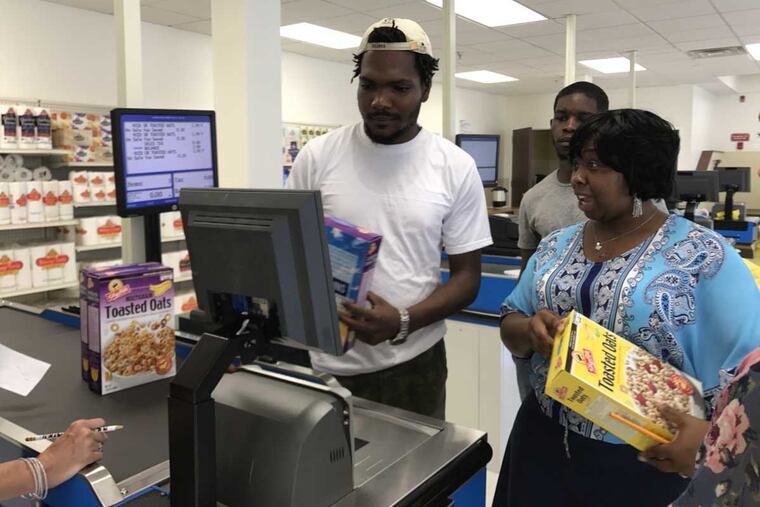Ex-inmates in Philly graduate to a new work life
On Wednesday, the 22-member first class graduates from Uplift Solutions' prison-to-productivity pathway engineered as a partnership between Brown's SuperStores, which has promised to hire every graduate, and Enon Tabernacle Baptist Church.

When the cops stormed into the crack house, Danielle Smith-Berry was hiding in a closet, heart beating hard. If they found her, she'd go to prison, because there were warrants for her arrest, left from the times she flunked probation for using drugs.
"But something in me was tired. … I was dirty and I didn't want that life no more," she said. "I was in the closet, and I came out."
That decision put her in prison: Five years — released Dec. 22, 2016.
These days, Smith-Berry, 36, dreams of being a social worker.
First step to the dream is a $7.75-an-hour part-time job as a supermarket cashier. She will start at the Brown's ShopRite on Fox Street next week, one of 13 ShopRite and Fresh Grocer stores owned by Jeffrey Brown and his family.
The mere thought makes her cry, with the tears halfway between joy and hope, and grief for the many lost years.
"I had hit rock bottom," she said. "I was shooting heroin, smoking crack, dirty. I was prostituting. I lived and breathed getting high and I went all the way down. I wouldn't sleep for four days. If I did, I might sleep in a crack house. It was horrible, horrific. I'm still in the process of healing and it didn't hit me how painful my past was."
On Wednesday, Smith-Berry, who hopes to go to college, will graduate, one of 22, from the first class of Uplift Workforce Solutions' prison-to-productivity pathway, a partnership between Brown's SuperStores, which promised to hire every graduate, and Enon Tabernacle Baptist Church, which provided a training room with cash registers and computers. Also contributing to the program's $505,000 first-year budget are two funders: the Nerney Family Foundation and the United Way of Greater Philadelphia and Southern New Jersey.
"For the first time, I wasn't treated as an ex-offender," Smith-Berry said. "I wasn't frowned upon."
Many reentry programs promise help with finding a job — but this one guarantees a job, for 20 hours.
It doesn't add up to much money, certainly not enough to support a person. But that doesn't bother Smith-Berry. "For the past five years, I was making 21 cents a day, living in a two-by-four," she said. "It's not about the financial gain. This is a career path."
The program has delivered on every promise — $125 a week stipend, a free bus pass, a lunch every day, and a job. "I'm so excited," she said.
At graduation Wednesday, Brown told the group that the first young man with a criminal record he hired reminded him of his sons — young, not always on the right path. "He just needed some fatherly or brotherly advice [to become] a promising human being."
It made him wonder how many people out here have been "disparaged and overlooked," but just wanted to do the right thing, have a family, make a living. "We want to shine a light on all these good people and give them an opportunity."
And he wants to encourage other employers to do the same.
Earlier in the ceremony, class leader LaShawna Bennett, back from drug charges at Muncy Prison, stepped up to the microphone:
The program, she said, "made us understand our capabilities. When you go through the judicial system, you lose who you are." Then she turned to Brown, addressing him, as her voice cracked and tears began to rim her eyes. "Because of you, because you opened doors for us, we respect that and we are grateful to you. I'm going to say this to you — we're going to make you proud."
The applause was thunderous.
Will it work? The literature on reentry says that jobs make a difference, but not by themselves. Most reentry job programs include social services to help ex-prisoners with such hurdles as a lack of housing and the effects of child abuse.
Uplift's six-week program started with classes in self-esteem, anger avoidance, and customer service. It was a month into the program before the students even put their hands on the registers. Students were recruited from RISE, the city's prison reentry program; Gaudenzia, a drug and alcohol rehab; Community Corrections Center, the city's jail system; and others. Enon was also allowed to place some students in the group.
The class began with 28 students, but lost six who couldn't meet attendance and punctuality requirements. "We knew we would lose some," program director Barry Johnson said. "But we don't want to just have graduates. We want people who will be good employees." Orientation for the next group of 30 begins Thursday, with classes set to start July 10.
Uplift hopes to have seven cohorts this year — 210 students and expects to graduate about 150 of them, following their progress for three years, because "recidivism drops substantially after three years," said Atif Bostic, who runs the Uplift Foundation, sponsor of the reentry program founded by Brown.
The staff included a longtime ShopRite trainer, Monique Oakman, and a social worker, Lauren Ruday.
"I learn from them every day," Ruday said, "how determined they are, despite the challenges that come their way. Nothing sways them. The struggles they have, losing family members, not having a stable place to live."